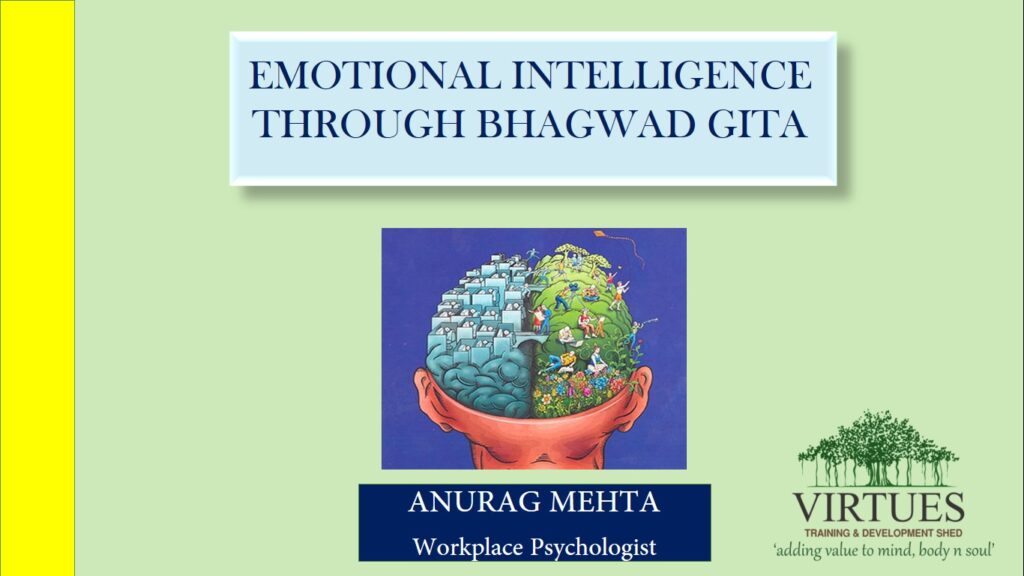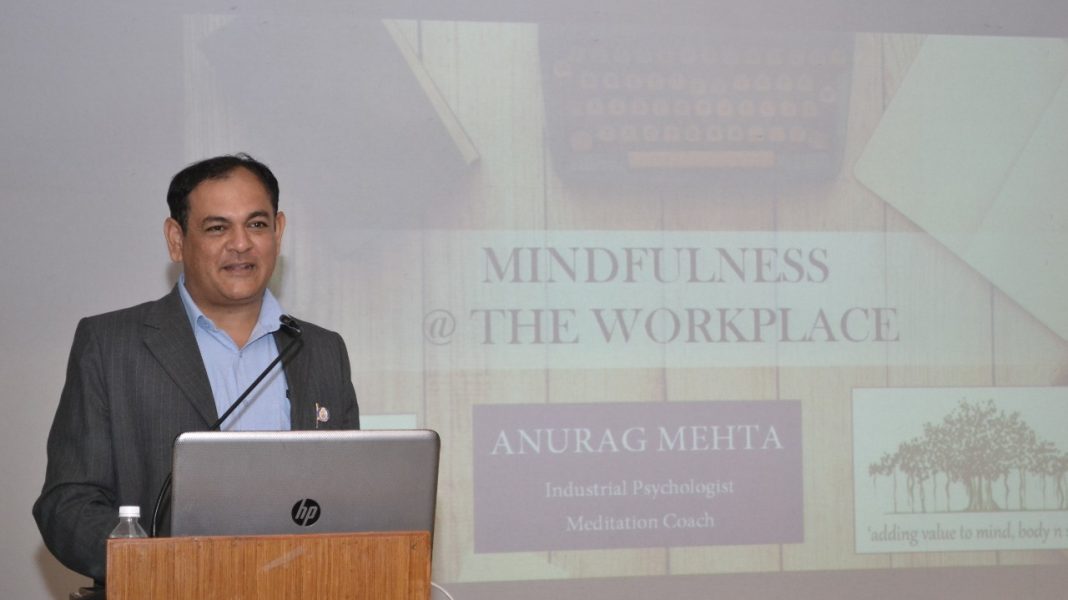BHAGWAD GITA IN MANAGEMENT AND ACADEMICS !
Lessons from the Bhagwad Gita – the holy book of psychology and philosophy in the personal, social and workplace space in an individual’s life. In the present situation where workplace stress and toxic environment at the workplace are a talk in every alley, we need to have a more practical and sustainable solution towards the way perceive our work and the work environment.
This is where Bhagwad Gita fills in the gap ! These are pictures of a few lecture interventions on Bhagwad Gita to the knowledge workforce.










Lord Krishna through Bhagwad Gita says to the distracted Arjun that your entire mental agony is because of your identifying yourself as this body which you are not. This body is just a tool to take you through this life which is one of the many in the past and future.
In shlok 2.23, Bhagwad Gita says that the atma cannot be harmed through a weapon or fire or water or wind or anything else. The atma is avadhya, meaning that it cannot be killed.
The attachment to this wrong identity, thinking of you as this character you are playing leads to all kind of unhappiness. This is because any happiness or unhappiness or events related to these are a product of the survival needs of this body. If we operate from the vantage point of the truth, that is when we understand that I cannot be this body, then I am free from the burden of happiness and unhappiness
While karmaṇy-evādhikāras te is the most common subject of karma yog in Bhagwad Gita, the foundationwas made earlier for this shlok in 2.32 and 2.33. What these tow mean in simple words is explained as under. There are three aspects relating to work and career. Krishna says you are very lucky if a combination of all three works for you simultaneously ! The three aspects are:
- You have a skill which makes you very relevant at the workplace. Like Arjun, Sachin, Virat, Messi, Steve Jobs you are hailed and wanted for your special skills.
- Because you are really good in the given work, you love to do that work and a thought never crosses your mind that you shouldn’t do the given work.
- Given that fact that you are excellent at a work and want to do it, stop here and imagine…what if there was no work for you, for whatever reason! So the message here is be happy if you have work which you can do and you love to do.
Covid-19 or market recession of 2008-09 have been recent examples with millions of such cases across the globe where qualified people were sitting without work. Bhagwad Gita says, if all three conditions meet in your case, just focus on the quality of work and nothing else.
Did you notice that in all of this discussion so far, we have not touched upon the domain of results yet? In 2.33 Krishna says that you will insult yourself and also account for sin if you say no to such a work and ditch your luck because such a combination where all three conditions meet is rare and you have it all served on the plate !
So do not worry on what you get out from work. You have your right on work only. This does not mean that you will not get any results or fruits of sincere work. Krishna says that your focus has to be the quality of work, the results will take care of themselves automatically.
For example, a farmer doesn’t get anxious about the crop in a couple of days of sowing seeds. He has to do his best in sowing seeds in the right depth, nurture the soil and relax. He has to trust that by just doing this much and supervising the field to save the seeds from birds, hi job is done. The fruits will surely come with time. There is no point in inviting workplace stress and related anxiety in life.
Also, it can be that sometimes the crop may not grow, due to drought for example. This is the time surrender to the choices of life has to be complete. Life will not be a red carpet all the time.
Wanting control on everything kills the beauty called life.
Remember, the only reason for unhappiness in life is the desire that there should not be unhappiness in my life !!
We need to keep working to the best of our ability always because that is what we can do. Attachment to results disturbs the effortless flow of life and that needs to be avoided is what Bhagwad Gita is saying through Karma Yog !
Continuing from Karma yog, the essence of Bhakti yog is unconditional surrender ! It is when we believe in the statement inspite of whetever difficult times we went through that ‘the only reason for unhappiness in life is the desire that there should not be unhappiness in life’.
An individual immersed in Bhakti Yog is emotionally intelligent. Bhagwad Gita calls this as sthitpragya (2.54).
Sthitpragya believes in the concept – ‘life is for office use only’. It is a state of unconditional surrender. A surrendered person knows that ‘true luxury is when you do not need anything to be happy’ Sustainable happiness comes from non-attachment in life, to whatever is there that life offers in the story of this temporary character that we play during our stay on this karmabhoomi.
Bhakti bhav is when you go the temple as a daily routine and thank god unconditionally. You do not want to go to the temple to ask anything. You are surrendered, complete as you are ! Even if something unpleasant happens in your life you are not having complaints and you don’t get stressed or depressed. You don’t think of harming yourself, you do not complain for the quality of a seemingly miserable life that you might think you might have, you do not burn in the fire of revenge for example or think of doing something unethical. You are emotionally balanced and hence remember the balance sheet of karma that will be auditing you always and you will be wise enough to not justify your thoughts and actions in the wake of misery.
Similarly, in times of material of other worldly happiness, you do not get carried away. You do not show off, embarass or belittle anyone, remain grounded and do not try to hoard or overtly safegaurd your possessions and getting stressed over losing them and spending a lot of mental energy in trying to safegaurd things that you have. You do not become selfish and live only for yourself.
Bhakti bhav reminds you of complete surrender. It wants you to remember that easy of difficult times don’t last forever and hence do not get attached tp them unnecessarily and carry virtaul burdens foolishly.
Be free is what bhakti bhav says. An emotionally intelligent, detached person never wants to become small by asking anything from life or god ! If at all, he will say – oh god – God, grant me the serenity to accept the things I cannot change, the courage to change the things I can, and the wisdom to know the difference – Reinhold Niebuhr.
As the popular doha from Kabir says – kabira khada baazaar mein mange sabki khair, na kahu se dosti, na kahu se bair !
Any discipline which wants to add value to life will always imbibe the virtue of anushasan, parampara and pratishtha. In the popular movie, the actor who spoke about these pillars of organisational legacy and success was portrayed as a villian. When we look at this from the vantage point of Bhagwad Gita, we realise the Krishna tells Arjun that you need to follow your swadharma and that will lead you to fame and glory. Swadharma is to be performed with discipline as a habit.
So rephrasing the popular statement in Bhagwad Gita’s context – ‘jeevan mein anushasan jab parampara ban jaata hai tab pratishtha apne aap aa jati hai ‘. In English it will go like – ‘when discipline becomes a culture ( not just habit) in your life, fame, glory, success, and dignity will follow you effortlessly like a shadow !!’
If we closely see the lives of successful people, discipline has been a center stage of their work culture and life per se.
In the attempt to create the karmic balance ethically and fairly, the creator has his own format of balance sheet. His balance sheet has the columns of ‘giving’ and ‘taking’. The premise of this balance sheet is ‘na kuch le kar aaye the, na kuch le kar jana hai’.
So whatever the quality of life has been, in the final appraisal, the question life asks you is, how much did you give out of what I had provided you and how much your focus was on the selfish accumulation of material wealth which you had to anyways leave when you would exit this game called life.
In the balance sheet of life therefore, the better performance to get a good rating will be a bigger quantum of having given than taking. We need to end our life as a net giver. This means not just monetary charity but also helping people for example old people or the handicapped ones or giving away your seat for a more needy person, giving a genuine smile as much as genuinely showing happiness to meet colleagues for example at office or clients. The list can be very long but the intention is to add value to the society from what you have and you can. It must be said here that one of the biggest of all giving is forgiveness. It lightens your baggage and adds in the balance sheet as a sure shot super brownie point in the Giving column !
Instead it is foolish to live in a selfish comfort zone, being greedy, unethical or giving charity in temples but not serving a hungry or a poor man. People mercilessly waste food in parties or even home or throw away birthday cakes like a wasted toy and then cry later when life serves them a bitter fruit.
The balance sheet of life serves you a good performance when you remember that whatever I have been given by life as material or non material asset, it is my humble duty to be of service to the society.
I have to ensure that I am a ‘net giver’ in the life given to me !
As part of being the net giver, sewa bhav, the intention to serve makes us very human. It separates us from an animal life because we as humans have been given a faculty of contemplation, introspection, gratitude, forgiveness and service. Animals do not possess that, we humans do. It’s time we understand that as humans we need to use the faculties to justify the human opportunity being provided to the soul.
Whenever we enter our workplace in the morning, we must have an intention of service. We have a particular skill for which the organisation has hired us. We should feel that I would serve all my stakeholders including my clients and vendors with the best intention. Bhagwad Gita says that work with a positive intention to serve, leave the rest on life. Develop unconditional surrender in work. On the contrary, people work with an intention of ‘what’s in for me‘.
This approach doesn’t mean that you become dependent on the organisation’s choices. Remember, every management wants to retain the best in their workforce. If you are good, they will have to do justice to you. But you must know that you should present your priorities in black and white which leaves no room for ambiguity. Many times the lack of clarity within the employee is the reason for his downfall, not the leadership or office politics.
If you present yourself appropriately and work with the best of intention towards a win win mindset, no one can stop you from growing.
Sewa mindset keeps you free and relaxed as long as you are clear in your mind. You feel great about the work you do, produce the best possible quality and never get tired. Most importantly, inspite of ups and downs in a daily routine, you remain unaffected and happy !